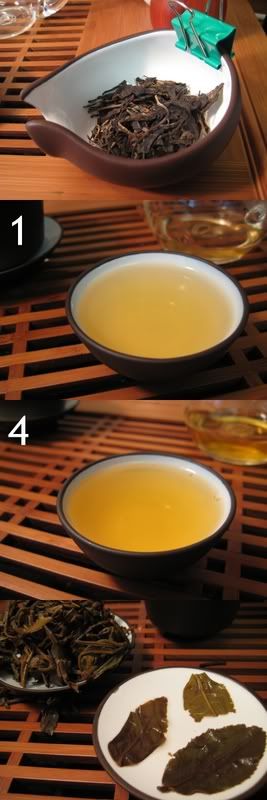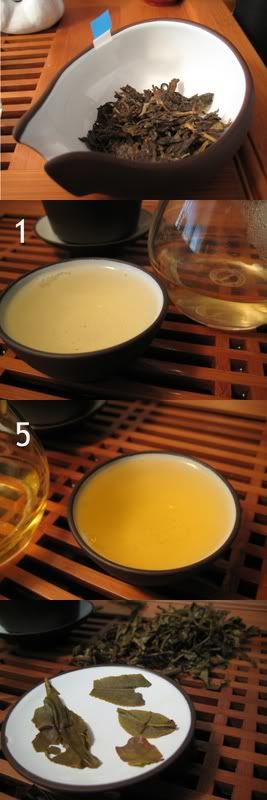 2006 Changtai Jinzhu (A.K.A."Green")
2006 Changtai Jinzhu (A.K.A."Green")I, like Mary, am inexperienced with puerh (especially shengpu). Also like Mary, I enjoyed this sample. This is not to say I want to run out and buy a tong of it, but then again I'm not sufficiently acquainted with puerh to want to buy a tong of anything. This tea also provided me with a bit of experience in what is called cha qi. [Being a skeptic of Chinese medicine, perhaps stubbornly so at times, I am hesitant to accept the concept of qi, but I will use the term "cha qi" because there isn't another word commonly used to describe the concept.]
Dry Leaf:
The dry leaf has a lovely range of color, from brownish-green to green, with a few off-white tips. The aroma is surprisingly pleasant (again, I'm a noob, give me a break), and smells of dry, earthy mushrooms, but with a brighter citrus/acid and floral high note.
Parameters:
8.1g leaf; 100mL gaiwan; filtered tap water (boiling); 8s rinse, 11s, 15s, 13s, 11s, 12s*
*These times include pouring and decanting.
Liquor:
In general, the liquor was sweet, light-bodied, mushroomy, and woodsy. There was a mild hui gan at times, and a strong drying astringency throughout the session, leaving my tongue battered and useless by the 5th infusion. I didn't think it was very bitter, just drying. The flavor of the brews seemed to be fairly consistent across all the infusions, though there seemed to be more sweetness with shorter brews and more dryness with longer ones.
Though others seem to have thought this tea's cha qi to be ordinary, I, having never paid much attention to the concept, thought it was a mite overwhelming. Despite the air conditioning in my dorm, I broke out in a cold sweat during the second infusion, and felt quite heavy-headed by the end of the session. It was only unpleasant in that I didn't know what to expect.
Last Words:
I was pleasantly surprised by this shengpu, as I have had some rather poor impressions of the shengpu genre in the past. I don't feel like I know enough yet to give this a rating, but I thought it was interesting and enjoyable.
 2007 Shuangjiang Mengku (A.K.A. "Red")
2007 Shuangjiang Mengku (A.K.A. "Red")Okay, so maybe the second and third reviews haven't been done as soon as I anticipated. I'm still well within the two-week grace period, though. :)
This time, I tried the "red" sample, and my impressions are as follows.
Dry Leaf:
Similar to the "green" sample leaves; consisting of greens, browns, and off-whites; though a bit more leaves fell into the brown range. This wasn't compressed as much as the green sample, and was mostly loose when I opened the bag. The aroma in said bag was pleasantly mellow and sweet, smelling of mushrooms (no tobacco or much else, from what I could gather).
Parameters:
8.1g leaf; 100mL gaiwan; filtered tap water (boiling); rinse, 11s, 15s, 14s, 12s, 10s, 11s
Liquor:
I didn't like this tea too much— it seemed quite fickle about steep time, and I frequently (read: all but twice) ended up with a strongly bitter and harsh brew.
 When the harshness wasn't dominant, the liquor tasted mostly of tobacco with a hint of mushrooms, which was quite a change from the dry leaf. Steven noted a similar difference between the liquor and the wet leaf, and I think he puts it best: "The wet leaves were like a spring time air while the brewed tea was like an autumn forest." There was usually a gently sweet hui gan, though this was masked in some of the more intensely bitter infusions. I should also note that there was a good amount of particulate in the cup and a sludge-like suspension left in the bottom of the cup after each infusion.
When the harshness wasn't dominant, the liquor tasted mostly of tobacco with a hint of mushrooms, which was quite a change from the dry leaf. Steven noted a similar difference between the liquor and the wet leaf, and I think he puts it best: "The wet leaves were like a spring time air while the brewed tea was like an autumn forest." There was usually a gently sweet hui gan, though this was masked in some of the more intensely bitter infusions. I should also note that there was a good amount of particulate in the cup and a sludge-like suspension left in the bottom of the cup after each infusion.Unlike with the green sample, I didn't have a very strong reaction to the cha qi of this tea. I felt the same sort of head heaviness, but no warmth whatsoever. To be fair, I did assume a more leisurely pace through this tasting, so that may have had some effect, but I doubt it was entirely due to a delay between a couple of infusions. This cha qi stuff sure is mysterious.
Last Words:
Though I liked this more than the majority of the shengpu I have tried, it wasn't my favorite, especially after trying the green sample. This red sample was much more temperamental, and generally less stimulating than the green.
 2007 Guoyan "Phoenix of Yiwu" (A.K.A. "Blue")
2007 Guoyan "Phoenix of Yiwu" (A.K.A. "Blue")Dry Leaf:
This is the only sample to have survived in a (more or less) single chunk. Still not too hard to pry apart, though. The aroma is markedly different from the rest— it is very potent, full of fruity and floral fragrance, and has a bit of a twang (I don't typically use this word to describe aroma, but I lack a better way of describing it) to it.
Parameters:
8.0g leaf; 100mL gaiwan; filtered tap water (boiling); 8s rinse, 9s, 11s, 12s, 12s, 15s
Liquor:
This is definitely the sweetest-tasting sample of the three. I couldn't pick out much in the flavor, except a touch of tobacco. There was a lingering, sweet hui gan which was more intense than in the other two samples, and a consistently mild astringency. This tea also stimulated a good deal of salivation, which was pleasant.
I couldn't detect any cha qi in this sample. I didn't experience any of the sensations mentioned above. Also, while my jaw tightened up at the first signs of qi during the previous two tastings, (sort of like an early-warning device) nothing of the sort happened this time.
Last words:
I liked this tea, but not as much as the green sample I tasted first. I thought it was quite sweet and pleasant, but not all that stimulating or interesting.
Wrap-up:
Here are the three samples ranked in order of descending preference:
1. 2006 Changtai Jinzhu (Green)
2. 2007 Guoyan "Phoenix of Yiwu" (Blue)
3. 2007 Shuangjiang Mengku (Red)
Thanks again to Hobbes and Dragon Tea House for organizing and providing for this online tasting! Though my experience with puerh is still quite lacking, I am glad I participated. I'm looking forward to next time. :)


Hey, is that a kamjove I see in the background?
ReplyDeleteMmm...office supplies. :)
ReplyDeleteIt's a great review--particularly your attention to cha qi. Like I mentioned before, I wasn't sure if it was the tea making me 'mist,' or the fact that I was hovering over the kettle. :)
I love this blog. It's great to see another guy in his twenties who loves tea and is proud of it! Keep up the good work.
ReplyDeleteSalsero: Sure is!
ReplyDeleteMary: Thanks! Man, you should see my desk drawer, there are so many office supplies...
Eric: I'm glad I have guys in their 20s reading this thing! Thanks for the praise. :)
-Brent
Congrats on having your first experience with cha qi! It sounds about right.
ReplyDeleteI think most of us bloggers are in our 20s :)